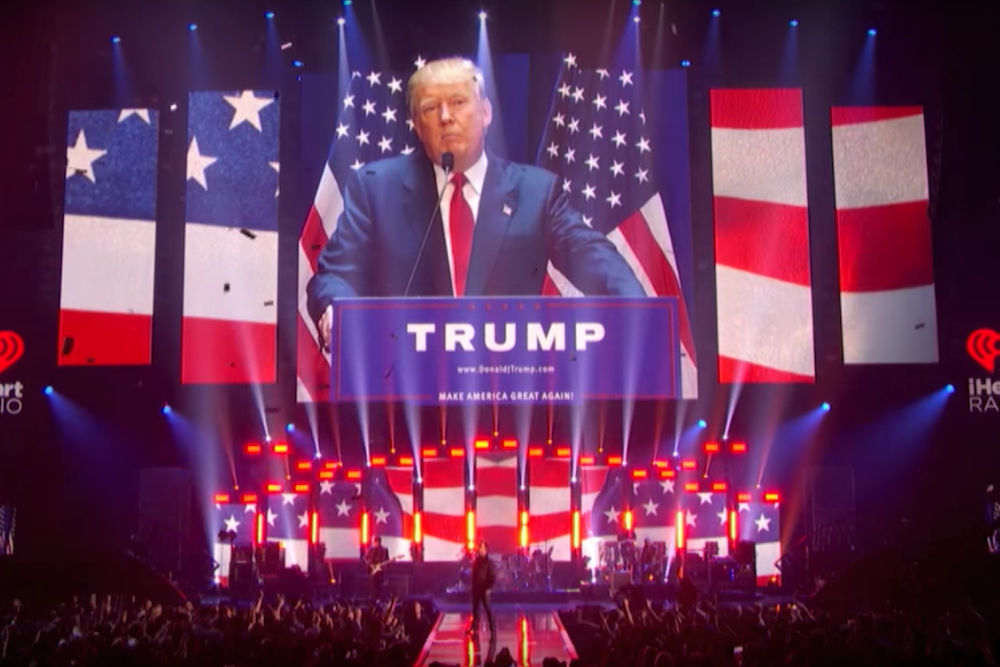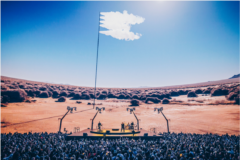Onstage this weekend in Las Vegas, a gilded city whose chief industry is separating starry-eyed Americans from their cash, Bono offered an unconvincing rebuttal to the man who hopes to become our next President.
U2 was performing Friday at the T-Mobile arena as co-headliner of the iHeartRadio festival’s 2016 edition. The band summoned a larger-than-life video image of Donald Trump during the bridge of their song “Desire,” sampling snippets from two of the candidate’s apocalyptic tent-revival campaign speeches. The first was a clip of Trump addressing an audience of black voters this month, asking them what they have to lose by voting for him. Bono, a longtime liberal activist, replied with a few cherished possessions that we all might have to give up during a hypothetical recession under Trump: your car and your house.
The second was more ominous. “The American Dream is dead,” Trump said on the screen, excerpted from the speech in which he formally announced his candidacy last year. “The American Dream is alive!” Bono countered, raising one finger above his head. The band broke triumphantly into “Desire”‘s Bo Diddley beat–remnants of the blues, black America’s poetry of poverty–and the screen flashed with images of a roulette table, a stack of hundred-dollar bills, a car cruising the Vegas strip. The rhetorical uplift brought to mind the 2016 Democratic National Convention, when, after the sturm und drang of Trump’s RNC, Hillary Clinton and her surrogates reassured Americans that America is on the right path. “America is already great,” President Obama said from the stage, countering the slogan that now appears on a million red hats.
Bono performing this spectacle at an event hosted by iHeartRadio is surreal in itself. Thanks to efforts like Product Red, he is the world’s mascot for branded activism. iHeartRadio Festival is hosted by iHeartMedia, the company formerly known as Clear Channel. Following federal deregulation of the radio industry in 1996, Clear Channel immediately began acquiring and homogenizing stations, expanding its stable from 43 broadcasters in 1995 to 1,200 just eight years later. Today, iHeartMedia is by far the largest operator of radio stations in the U.S., and the formerly rich and varied broadcast dial has been remade in its glossy image. The company is reflective of an industry formerly controlled by a network of scrappy small businesses falling to a faceless corporate overlord–you could argue that it’s part of the narrative that Trump invokes when he says that the “American dream is dead” and promises that only his brand of power-suit nationalism can bring it back.
Here’s the thing: The “American dream,” as Trump describes it (and as it has been parroted onward by his supporters), never really existed in the first place. The pastoral vision of the 1950s that it conjures up–strapping young men working their way up the corporate ladder, buying a house, putting two cars in the garage–was a version of the country in which only white Americans were invited to participate. Trump pitches his vision for America accordingly: Minutes after proclaiming the dream dead in his announcement speech, he first made the now-infamous claim that Mexican immigrants are rapists and drug dealers.
Public figures like Trump, Clinton, and Bono have been declaring the American dream dead or alive as a way to stake out their territory in political battles for as long as there’s been the vague idea of an American dream at all. It is always empty, subjective, and signifies absolutely nothing. And responding to Trump’s meaningless slogan with a meaningless slogan of your own means to surrender the terms of the debate to him–whether it be Bono onstage at iHeartRadio, or Clinton onstage tonight, when she faces off in debate against Trump for the first time.





